Tennessee Williams facts for kids
Quick facts for kids
Tennessee Williams
|
|
|---|---|
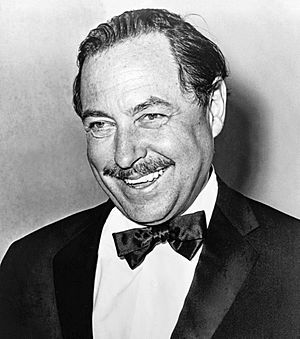
Williams in 1965
|
|
| Born |
Thomas Lanier Williams III
March 26, 1911 Columbus, Mississippi, U.S.
|
| Died | February 25, 1983 (aged 71) New York City, U.S.
|
| Resting place | Calvary Cemetery St. Louis, Missouri, U.S. |
| Education | University of Missouri Washington University in St. Louis University of Iowa (BA) |
| Occupation |
|
| Years active | 1930–1983 |
| Signature | |
Thomas Lanier Williams III (March 26, 1911 – February 25, 1983) was a famous American writer. He was known by his pen name, Tennessee Williams. He wrote many plays and screenplays. People think he was one of the three most important American playwrights of the 20th century. The other two were Eugene O'Neill and Arthur Miller.
When he was 33, Williams became very famous. This happened after his play The Glass Menagerie (1944) became a big hit in New York City. In this play, he used a new style called "plastic theatre." This style showed his own family life, which was not always happy. After this, he wrote many more successful plays. These include A Streetcar Named Desire (1947), Cat on a Hot Tin Roof (1955), Sweet Bird of Youth (1959), and The Night of the Iguana (1961). Many of his plays were made into movies. He also wrote short stories, poems, and essays. In 1979, he was honored in the American Theater Hall of Fame.
Contents
Early Life and Family
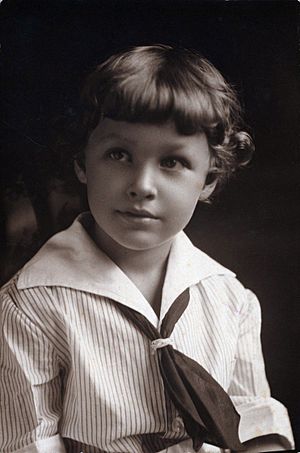
Thomas Lanier Williams III was born in Columbus, Mississippi. His parents were Edwina Dakin and Cornelius Coffin "C. C." Williams. His father was a traveling shoe salesman and was often away. His mother, Edwina, was the daughter of a music teacher and a church priest.
Williams spent much of his early childhood living with his grandparents in their church home. He was very close to them. He had an older sister, Rose Isabel, and a younger brother, Walter Dakin.
When Williams was a young child, he got very sick with diphtheria. This made him weak and he had to stay home for a year to get better. Because of this illness, his father thought he was a weak child. His father had a strong temper and did not like what he saw as his son's gentle nature. His mother, who was not happy in her marriage, focused a lot of attention on her son. Many people believe that Williams used his own family experiences in his plays.
When Williams was eight, his family moved to St. Louis because his father got a new job. They moved many times around St. Louis. Williams went to Soldan High School, which he later wrote about in The Glass Menagerie.
When he was 16, Williams won a prize for an essay. A year later, his short story "The Vengeance of Nitocris" was published. These early writings did not make him famous right away. He worked hard for over ten years to become a successful writer.
Education and Early Career
From 1929 to 1931, Williams went to the University of Missouri. He studied journalism but found his classes boring. He started writing poems, essays, stories, and plays for contests. His first play, Beauty Is the Word (1930), was about standing up against strict rules.
Williams joined a fraternity at the University of Missouri, but he did not feel like he fit in. After he failed a military class, his father made him leave school. He then worked at his father's shoe factory. Williams hated this job, but it made him want to write even more. He tried to write one story every week. He often worked on his writing late at night.
After a few years, Williams felt very tired and unhappy. He had a nervous breakdown and left his job. He later used his experiences from this time to create characters in his plays. Around this time, his mother and father separated.
In 1936, Williams went to Washington University in St. Louis. He wrote another play there. He later transferred to the University of Iowa and earned a degree in English in 1938. He also studied theater in New York City. Williams once said that writing for the theater "saved his life." Around 1939, he started using "Tennessee Williams" as his writing name.
Writers Who Inspired Him
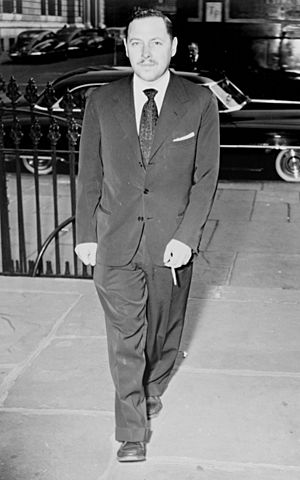
Williams was inspired by many poets and writers. Some of his favorites were Hart Crane, Arthur Rimbaud, Anton Chekhov, William Shakespeare, D. H. Lawrence, and Emily Dickinson.
Becoming a Famous Playwright
In the late 1930s, Williams worked many small jobs while trying to get his plays produced. In 1939, he received a grant of $1,000 for his play Battle of Angels. This play was performed in Boston in 1940, but it was not very popular.
Williams moved to New Orleans in 1939. He lived in the French Quarter, which later became the setting for his play Vieux Carré. The grant also helped him get a writing contract with a Hollywood film studio.
In 1944, his play The Glass Menagerie was performed in Chicago and received good reviews. It then moved to New York and became a huge success on Broadway. A famous director, Elia Kazan, said that Williams put everything from his life into his plays. The Glass Menagerie won an award for the best play of the season.
His next play, A Streetcar Named Desire, was also a massive hit in 1947. This play made him known as a truly great playwright. In the late 1940s and 1950s, Williams traveled a lot. He lived in New York, New Orleans, Key West, Rome, and London. He moved often to find new ideas for his writing.
Between 1948 and 1959, seven more of his plays were shown on Broadway. These included Summer and Smoke (1948), The Rose Tattoo (1951), and Cat on a Hot Tin Roof (1955). By 1959, he had won two Pulitzer Prizes and many other awards.
Many of Williams's plays were made into popular movies. These included The Glass Menagerie, A Streetcar Named Desire, and Cat on a Hot Tin Roof.
After his great success in the 1940s and 1950s, Williams faced more challenges in the 1960s and 1970s. He continued to write every day, but his new plays were not as popular. Many of his later plays did not do well at the box office. Critics and audiences did not seem to like his new writing style. His last play, A House Not Meant to Stand, was performed in Chicago in 1982.
In 1974, Williams received the St. Louis Literary Award. In 1979, he was inducted into the American Theater Hall of Fame.
Personal Life and Relationships
Williams always stayed close to his sister, Rose. When she was young, she was diagnosed with a mental illness. In 1943, she had a brain operation called a lobotomy, which meant she needed to live in a special care home for the rest of her life. As soon as Williams had enough money, he moved Rose to a private place near New York City. He visited her often and gave her money from his plays to help pay for her care.
Williams had a very important relationship with Frank Merlo, who was an actor. This relationship lasted for 14 years. Merlo helped Williams with his daily life and brought him happiness and stability. Williams often worried that he might also struggle with mental health, like his sister Rose. His years with Merlo were some of his happiest and most productive. Merlo later became very sick, and Williams took care of him until he passed away in 1963.
After Merlo's death, Williams went through a very difficult time. He was very sad and had to be hospitalized several times for his mental health.
As he got older, Williams felt more and more alone. In the 1970s, he had a long relationship with Robert Carroll, a young writer. Williams cared deeply for Carroll. Carroll was one of the two people who received something in Williams's will, along with his sister Rose.
Later Life and Legacy
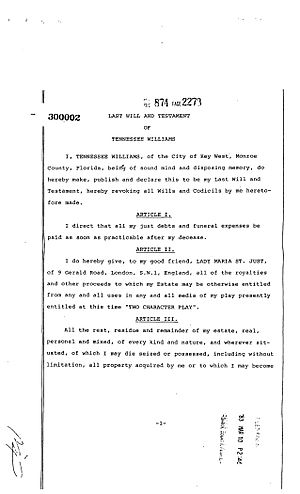
Tennessee Williams passed away on February 25, 1983, at the age of 71, in his hotel room in New York City. The medical examiner said he died from accidentally choking on a plastic cap.
Williams was buried at Calvary Cemetery in St. Louis, Missouri, next to his mother.
He left his writing rights to Sewanee: The University of the South, a university in Tennessee. This was to honor his grandfather, who had attended the school. The money from his writings helps support a creative writing program there. When his sister Rose passed away in 1996, she also left a large amount of money from her share of Williams's estate to the same university.
Honors and Recognition
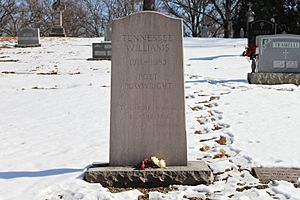
In 2011, to celebrate 100 years since his birth, the Harry Ransom Center in Texas held an exhibit about Williams. It showed 250 of his personal items, including his writings, letters, and photos.
Williams was honored in the Poets' Corner at a cathedral in New York in 2009. Many famous actors and artists took part in the ceremony.
The Tennessee Williams Theatre in Key West, Florida, is named after him. There is also an exhibit in Key West that shows rare items belonging to Williams, including his typewriter.
At the time of his death, Williams was working on a final play called In Masks Outrageous and Austere. This play explored themes from his own life. It was first performed in New York City in 2012.
The old home of St. Paul's Episcopal Church in Columbus, Mississippi, where Williams's grandfather was a priest, was moved and saved. It is now the Tennessee Williams Welcome Center for the city.
Since 1986, the Tennessee Williams New Orleans Literary Festival has been held every year in New Orleans. It takes place in late March, around Williams's birthday.
In 2014, Williams was honored on the Rainbow Honor Walk in San Francisco. This walk celebrates LGBTQ+ people who have made important contributions.
In 2015, a theater company in New Orleans was founded, focusing only on Williams's plays. St. Louis, Missouri, also holds an annual Tennessee Williams Festival.
The U.S. Postal Service honored Williams with a stamp in 1995. He also has stars on the St. Louis Walk of Fame and the Clarksdale Walk of Fame.
Famous Works
Characters in Williams's plays often seemed to be based on his own family members. For example, Laura Wingfield in The Glass Menagerie is thought to be like his sister Rose. Some people believe that Blanche DuBois in A Streetcar Named Desire was also inspired by Rose and her mental health struggles.
Amanda Wingfield in The Glass Menagerie was generally seen as representing Williams's mother, Edwina. Characters like Tom Wingfield in The Glass Menagerie and Sebastian in Suddenly, Last Summer were thought to be like Williams himself.
Williams won the Pulitzer Prize for Drama for A Streetcar Named Desire in 1948 and for Cat on a Hot Tin Roof in 1955. Both of these plays were made into very successful movies.
Williams wrote The Parade, or Approaching the End of a Summer when he was 29. He worked on it throughout his life. This play was partly based on his own romantic experiences. It was first performed in 2006.
Plays
- Candles to the Sun (1936)
- Fugitive Kind (1937)
- Spring Storm (1937)
- Me Vashya (1937)
- Not About Nightingales (1938)
- Battle of Angels (1940)
- I Rise in Flame, Cried the Phoenix (1941)
- The Glass Menagerie (1944)
- You Touched Me (1945)
- Stairs to the Roof (1947)
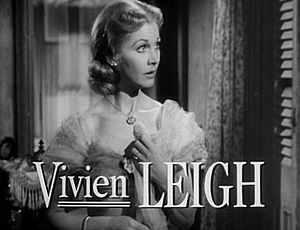
- A Streetcar Named Desire (1947)
- Summer and Smoke (1948)
- The Rose Tattoo (1951)
- Camino Real (1953)
- Cat on a Hot Tin Roof (1955)
- Orpheus Descending (1957)
- Suddenly Last Summer (1958)
- Sweet Bird of Youth (1959)
- Period of Adjustment (1960)
- The Night of the Iguana (1961)
- The Eccentricities of a Nightingale (1962)
- The Milk Train Doesn't Stop Here Anymore (1963)
- The Seven Descents of Myrtle (1968)
- In the Bar of a Tokyo Hotel (1969)
- Small Craft Warnings (1972)
- The Two-Character Play (1973)
- Vieux Carré (1977)
- A Lovely Sunday for Creve Coeur (1979)
- Clothes for a Summer Hotel (1980)
- Something Cloudy, Something Clear (1981)
- A House Not Meant to Stand (1982)
- In Masks Outrageous and Austere (1983)
Novels
- The Roman Spring of Mrs. Stone (1950)
- Moise and the World of Reason (1975)
Screenplays and Teleplays
- The Glass Menagerie (1950)
- A Streetcar Named Desire (1951)
- The Rose Tattoo (1955)
- Baby Doll (1956)
- Cat on a Hot Tin Roof (1958)
- Suddenly, Last Summer (1959)
- The Fugitive Kind (1959)
- Boom! (1968)
Short Stories
- "The Vengeance of Nitocris" (1928)
- "The Field of Blue Children" (1939)
- Hard Candy: A Book of Stories (1954)
- Three Players of a Summer Game and Other Stories (1960)
- The Knightly Quest: a Novella and Four Short Stories (1966)
- One Arm and Other Stories (1967)
- Eight Mortal Ladies Possessed: a Book of Stories (1974)
- Collected Stories (1985)
Poetry
- In the Winter of Cities (1956)
- Androgyne, Mon Amour (1977)
Non-fiction
- Memoirs (1975)
Images for kids
See also
 In Spanish: Tennessee Williams para niños
In Spanish: Tennessee Williams para niños
 | Valerie Thomas |
 | Frederick McKinley Jones |
 | George Edward Alcorn Jr. |
 | Thomas Mensah |



